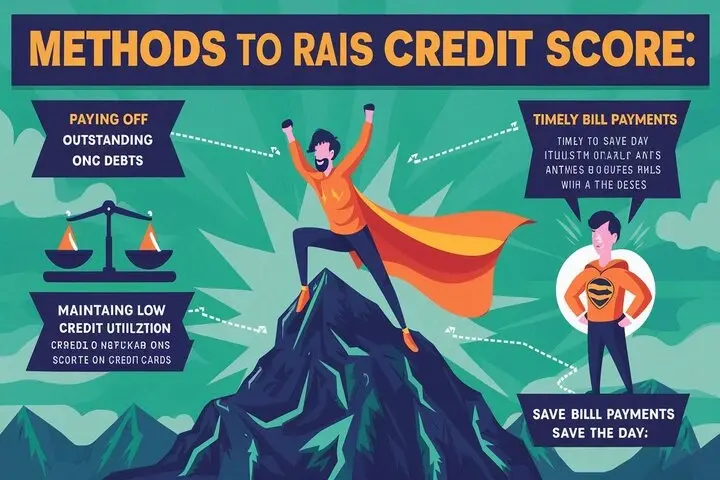-
Posted on: 29 Jul 2024

-
Credit scores are crucial to your financial life in a way that is hard to understand. It determines the ability to get loans and credit cards, which interest rate one is going to attract. The good news is there are measures you can take to increase your score in a relatively small amount of time if necessary. Here are the 7 most effective ways to increase your score:
Here are the 7 most effective ways to increase your score:
1. Pay Down Revolving Debt
This brings us to the second major determinant of credit scores – credit utilization, which measures the proportion of your credit limit for credit cards in circulation. Some of the industry experts have advised that this ratio should not be more than 30%. With this ratio, you only need to pay down your credit card balances and this will have an effect of increasing your ratio and hence improving your score. Pay your balances on each card as low as possible until they are below 30% of the maximum that the card can hold.
2. Become an Authorized User
Befriend or talk to a close relative who has a long credit history, high credit score, and little or no outstanding balance on his/her credit card and request to be an authorized user of the credit card. It means that, as an authorized user, the credit card’s whole payment record will then be reported from the moment on into your credit report. This can help you to have an immediate increase in your score particularly if you have a poor credit history or you have a short credit history.
3. That is why it is essential to dispute errors on your credit report first and foremost.
It is also possible to suffer from misreporting on the credit report, including wrong details, small mistakes, or credit details belonging to someone else. Go to annualcreditreport.com to access your credit reports, and I suggest going through each of the reports to challenge any mistakes you come across. Erasure is quite effective in enhancing the score, as it implies correcting the mistakes made by contestants.
4. Refinance Your Student Loans
Some of the benefits include refinancing your student loan to a lower interest rate which will both help you to reduce the amount you pay each month and also help in the credit mix. There are two general types of student loans: federal and private student loans, while the former does not affect the credit score of the borrower, the same cannot be said for the latter. Taking a new loan from a private financier involves paying off the prior student installment loan with a new, possibly beneficial one. The top tier of credit score is above 740, and people who fall under this bracket get the best rates.
5. I was an authorized user until it was deactivated or canceled, so let me become an authorized user again.
The detailed explanation of the points that have been described above is that the ability to become an authorized user on someone else’s credit card can positively affect the credit score. It is common to see many married people adding their partners as authorized users; it improves the partners’ scores. You can repeat the same by searching for some other person who is ready to add your Facebook account easily, it can be your friend or your close relative. The better the credit history which is contributed to the report, the better it is.
6. Optimize Credit Card Use
Be sure to have both types of credit, credit cards which are revolving credit, and fixed payment loans such as car, student, and mortgage among others, to ensure that you have a record of the positive payment history reflected in your credit report at a given time. One way of correctly using credit cards is to use only one card lightly and responsibly having a small balance and paying the dues on time can help in building the credit score.
7. Wait It Out
This simple message is often the best advice when it comes to understanding your credit score situation: Sometimes it just takes time. Records of credit inquiries, new accounts, or any credit mistakes that you have made in the past will fade with time. Your length of credit history is also going to increase at the same time. There are times when one has to manage their financing status properly, and the score will come up nicely within 6-12 months. However, it is advisable to refrain from any new application for the time being.
Adhering to any of these tips can generally increase your credit score by a minimum of fifty points to over a hundred and fifty points within the year. However, the most significant changes are subject to huge differences, considering one’s credit situation and initial credit score. Finally, be smart, wait, and let your good financial habits work to your advantage as you watch your important credit score inch up slowly through steadily.
Credit issues? We have the solution—call (888) 803-7889 for immediate help!










